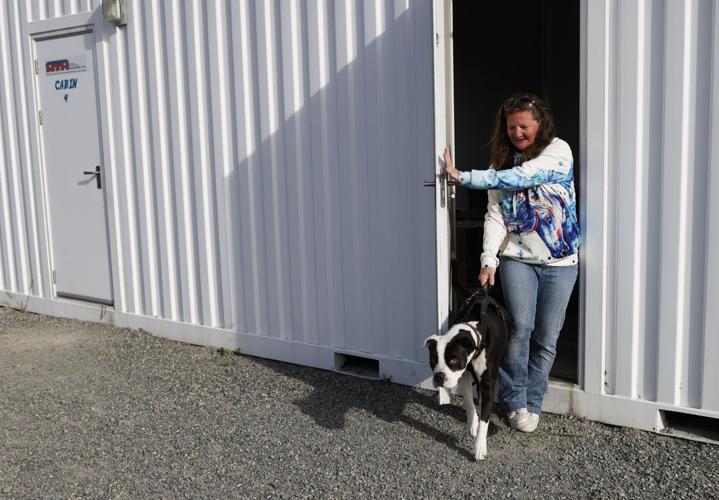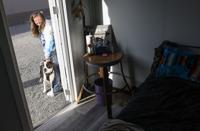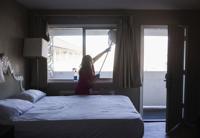Brandy Morrow lives with her two dogs Thor and Baby Girl in a "cabin" unit at Camp Hope in Yakima. The move has provided stability and a chance to improve her health.
Morrow was homeless for about four years prior to that. She rotated between living out of her car and under the Rest Haven Road bridge over Interstate 82.
Her new living unit is a white shipping container modified to house four people in individual rooms. The container has four doors on one side and four windows on the other, and the living units can be locked.
The cabin units are small but cozy. Inside her room, Morrow has a bed, a night stand and a closet for storage. Small adornments like the dream catcher that hangs on the wall opposite her bed and a single bright-red rose inside a glass dome bring life and color to the room.
"This given me quite a bit of stability back," Morrow said. "Support staff at the camp didn't give up on me. I'm very stubborn and independent and I've been able to get that back here, my independence."
While many of Camp Hope’s residents live in tents at the former Kmart off Nob Hill Boulevard, the container units provide another way to convince people to come in off the streets.
Mike Kay, the director of Camp Hope, said the units are a place for people who are uncomfortable sharing close spaces with others. In turn, an added level of stability in their lives can lead to better health outcomes.
“A lot of the people that are staying there are the ones that are chronically homeless,” Kay said. “They just can’t do congregate living. They have too much trauma. So having a tangible lockable door makes all the difference in the world for them.”
The containers are a handful of new services in Yakima funded by state grants and federal American Rescue Plan Act funds to help people experiencing chronic homelessness.
Camp Hope received ARPA funds for the container project from the city of Yakima. Kay says the organization plans on buying eight more units, creating a total of 36 single-person units.
About 670 people in the county are unhoused, according to the Yakima County 2022 Point in Time Report, which is the latest available data.
Getting help
Morrow’s story illustrates the complicated challenges involved in helping people who are chronically homeless.
For most of the time she was homeless, Morrow said she’s been unmedicated. It was difficult for her to live with other people. Tasks such as going to the grocery store usually led to panic attacks.
She is diagnosed with antisocial personality disorder, bipolar disorder, anxiety and PTSD.
Just under four months ago, in early December, while suffering from a kidney infection, Morrow decided to try and stay at Camp Hope. She had gotten a kidney stent and was long overdue to have it removed. Morrow said her doctors were hesitant to remove the stent, they were concerned about a second infection around her wound given her living conditions.

Brandy Morrow stands outside of her shipping container “cabin” room with her dog Thor at Camp Hope Wednesday, April 3, 2024, in Yakima, Wash.
During her intake process to stay at the camp, Morrow said one of her dogs got in a fight with a cat, which overwhelmed her. She left the camp and spent the weekend on the streets.
“I walked clear back across town in the freezing rain,” Morrow said. “They (Camp Hope) blew up my phone all weekend and they let me know because of my anxiety, they had a container room cabin, as they call them, available for me instead of putting me in a tent with others.”
Morrow was assigned one of the four units where she could stay with her two dogs and not have to worry about sharing a space with others. Because of her improved living conditions, her doctors went ahead with the surgery to remove her stent about a month after she moved into the container unit.
“One of the case managers stayed at the surgery center so I could get a ride back home,” Morrow said, gesturing to her container unit. “When I got back, they made sure that I had everything that I needed to rest and be away from people and they were very accommodating of my medical needs.”
What’s next
Last April, Comprehensive Healthcare announced it would use funds from a $1 million state grant to build an on-site behavioral health center at Camp Hope. Kay, the camp’s director, said the facility is yet to be built but that space has been set aside for it.
Comprehensive has a small cabin on site that serves as an office right now. The grant is also funding support staff to help residents like Morrow, who face behavioral health challenges.

The Comprehensive Healthcare office at Camp Hope is pictured Wednesday, April 3, 2024, in Yakima, Wash. Comprehensive Healthcare plans to build an on-site behavioral health center along the west side of Camp Hope where the trucks are parked in the photo.
Comprehensive also offers help with substance abuse issues for residents.
Kay said the goal is to turn the camp into, “One giant navigation center, which is what we call it in our world, where people can get housing, identification, help with behavioral health treatment, substance use disorder treatment so when they leave here and we do finding housing, there is a more holistic approach to it.”
The living units are built locally in Union Gap and cost about $40,000. Kay said they’re more cost-effective, durable and capable of withstanding Yakima’s four seasons better than a handful of individual units which are used widely in California and Oregon that go for $18,000 apiece.
Going into her fourth month of recovery, Morrow said with help from Camp Home, Triumph Treatment Services and Comprehensive Health, and Connections, a Neighborhood Health program, she is working on getting into low-income housing and reapplying for Social Security.
“It’s a good step compared to where I was at before. I’m 168 pounds now,” Morrow said, referring to the fact she weighed 106 pounds when she started living in Camp Hope. “I’m grateful that I have (the container) I don’t know that I’d be here without it.”



















(0) comments
Comments are now closed on this article.
Comments can only be made on article within the first 3 days of publication.